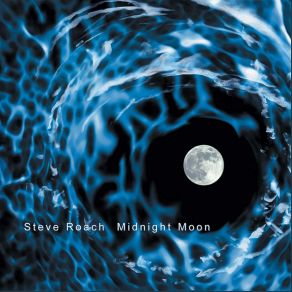Midnight Moon
Download links and information about Midnight Moon by Steve Roach. This album was released in 2000 and it belongs to Ambient, New Age, Electronica genres. It contains 7 tracks with total duration of 01:13:09 minutes.

|
|
|---|---|
| Artist: | Steve Roach |
| Release date: | 2000 |
| Genre: | Ambient, New Age, Electronica |
| Tracks: | 7 |
| Duration: | 01:13:09 |
| Buy it NOW at: | |
| Buy on iTunes $9.99 | |
| Buy on Amazon $9.49 | |
Tracks
[Edit]| No. | Title | Length |
|---|---|---|
| 1. | Ancestors Circle | 8:45 |
| 2. | Midnight Loom | 22:03 |
| 3. | Deadwood | 7:33 |
| 4. | Broken Town | 10:37 |
| 5. | Hope | 5:00 |
| 6. | Later Phase | 11:45 |
| 7. | Moon and Star | 7:26 |
Details
[Edit]While Midnight Moon may not be Steve Roach's first recorded encounter with a guitar, it is his first recording playing the guitar. The seven moody soundscapes that make up Midnight Moon are actually interrelated pieces based on Roach's experimentation with that instrument, a fretless bass, and the E-bow. Unlike Roach's other single-work concept pieces, such as Dreamcircle, The Magnificent Void, and others, the notion of movement on Midnight Moon is different: It doesn't move toward or away from anything or come back to the place it began. Its seven pieces are reflections, under the particular moons of midnight, from full perception of its glow to total darkness. The guitar in this instance is of particular use given its ability to present stark contrast and large empty spaces. From the nine-minute "Ancestor's Circle," where the trace of a physical space is all that remains in the memory of the perceiver, and what it tries to conjure of that place of observance, to "Midnight Loom," which is 21 minutes in the presence of that which is truly luminous, shimmering in its stark yet majestic beauty. A language is evoked between the three instruments of an image and its shadows, traces and fleeting sleights of mind. You can never be sure of what it is you are hearing or seeing — particularly if you listen in the dark! It's a gorgeous work that seems to dissolve as suddenly as it appeared, into Aether. "Deadwood" and "Broken Town" are not merely haunting pieces, they are haunted. They present the more ominous and lonely aspects of nocturnal presence and spectral visitation. This is the "dark night of the soul" so to speak. In "Hope" there is an emergence, of sorts. It is tentative, a glistening in the darkness, shard of light under the shade of night. It is as if there was something breathing, emanating under the dome of heaven, some visitation by a heavenly presence bringing comfort after the previous trial. And finally, in "Later Phase" and "Moon and Star," Roach has not so much come full circle as shown the phases and faces of the orb that controls the tides and offers solace to some and terror to others. As in "Ancestor's Circle," a hazy, gauzy history is invoked, called from special terrains that have long since passed from the earth though they inhabit our psyches, whisper to our emotions, and cause us to look inward to see where it is we come from. "Moon and Star" brings with its sonic architecture the full manifestation of those presences, not hunted but certainly haunted, brazenly shining in darkness and in light, threatening to no one and instructive for all who would look — and listen. This is a marvelous next step into Steve Roach's ever widening cavern of inner sound worlds.